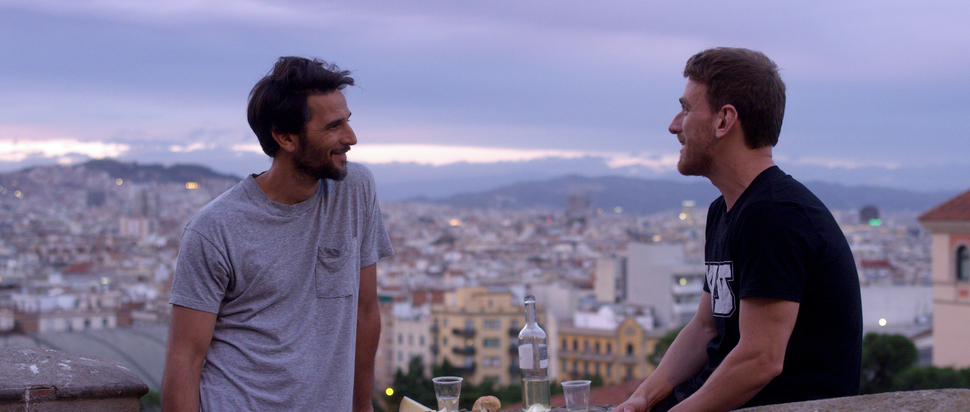Lucio Castro on End of the Century
Lucio Castro discusses his elegant use of time, space and memory in the moving romance End of the Century
“I feel like the gay world changed drastically over the last 20 years.” Filmmaker Lucio Castro is musing on the revolution to the lives of gay men over this period because that’s the precise time span of his bittersweet debut feature, End of the Century. The film’s elegant structure takes us from present-day Barcelona, back to the Barcelona of 1999, and then returns to the present again, although a slightly different version of it. When Castro started writing, however, he had something more straightforward in mind.
“I didn't know the structure at all,” he recalls. “I started writing the story in a very linear way.” The initial idea was to meet the main character, Ocho (Juan Barberini), and simply follow him around. “It started: a man arrives in the city, he does sightseeing, he eats, he gets horny, he jerks off, goes on Grindr, and the next day he finds someone and they start talking.”
The initial set-up recalls Andrew Haigh’s Weekend or Richard Linklater’s Before Sunrise, two other great films about passionate but ephemeral romances. Things got more complex – cosmic even – when Castro got into the meat of the relationship. “It was while I was writing the dialogue that it changed. I thought, 'Oh, actually they've met before.' So then I wrote scenes of how they met, and then at the end of that I said to myself, 'OK, maybe they've been together all this time.' So I just discovered the story as I was writing it.”
The film opens with Ocho, an Argentine writer who’s around 40, arriving in town and crashing at a soulless Airbnb. Javi (Ramón Pujol), a kids’ TV producer from Berlin, is the man Ocho blithely invites up to his room after spotting him on Las Ramblas from his balcony. The choice of an Airbnb apartment over, say, a hotel or a friend’s spare room was crucial to the atmosphere Castro was trying to create.
“He's living in an Airbnb, and that space is kind of weird, you know? It's not really a home, it's not a hotel, but it has some books, it's meant to feel a bit cosy, but it doesn't belong to anyone, but it does belong to someone; it's in limbo.” This feeling of limbo extends to the characters themselves. “Both Ocho and Javi are going through this moment in their lives where they're moving around and not settled, so, to me, the movie happens in a transient space.”
Space isn’t the only thing that’s transient in End of the Century. Time and memory also prove slippery. After spending the day together, the men come to the epiphany that they’ve met before – 20 years earlier. Cut to 1999 in the same city, when Ocho and Javi are both around 20 and still in the closet, where chance threw them together the first time. What’s most striking – and initially discombobulating – about this flashback is that the 20-something versions of Ocho and Javi are played by the same actors, with no attempt to make them appear any younger.
“That's my favourite part of the movie,” says Castro of this artistic choice. The inspiration to eschew de-ageing was partly practical. “Ageing is always tricky,” he says. “I always focus too much on the effect when I see it in movies. I just think ‘OK, good make-up/bad make-up, good wig/bad wig.’” Even more jarring is subbing in a different actor. “To me, that's super weird; you don't grow up to be a different person. So I wanted to kind of get rid of that and just say, OK, it's the same actors, and if the audience is smart enough, they’ll understand that it's a different time.”
But using the same actors for both timeframes also resonated thematically. “If I were to tell you that we actually met ten years ago, I wouldn't picture myself younger with you, or you younger, I would picture us the way we are now in the past," Castro explains. "That's the way we experience memory, I think.” To illustrate his point, Castro asks me how I feel when I see old photographs of myself. “It's always surprising, isn’t it?” he says. “We think, did I look like this? Because we forget. Our memories don't always make sense. It isn’t like a perfectly art-directed film.”
End of the Century has been sharply described as “Richard Linklater's Before trilogy, distilled into a single film,” and it has all the emotional power that description would suggest. It’s so evocative it’s sure to have you looking back at your own love life, and the fleeting romances that could have been so much more in different circumstances.
“For all the great people you meet throughout your life, it's with very few that you end up actually developing something, and I always wonder why. Why isn't the right person sometimes the right match? Is it just about meeting at the right moment? Or maybe there needs to be something right with both people when they meet? So I feel love is strongly related to time in some way, and this movie definitely explores that.”
End of the Century is available now on DVD from Peccadillo Pictures, or to rent from BFI Player and Curzon Home Cinema
